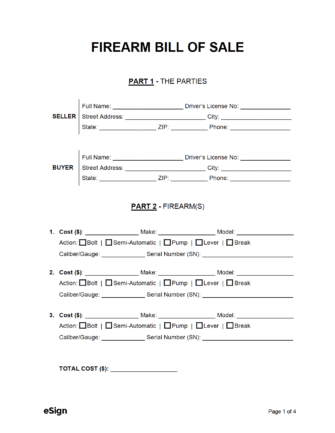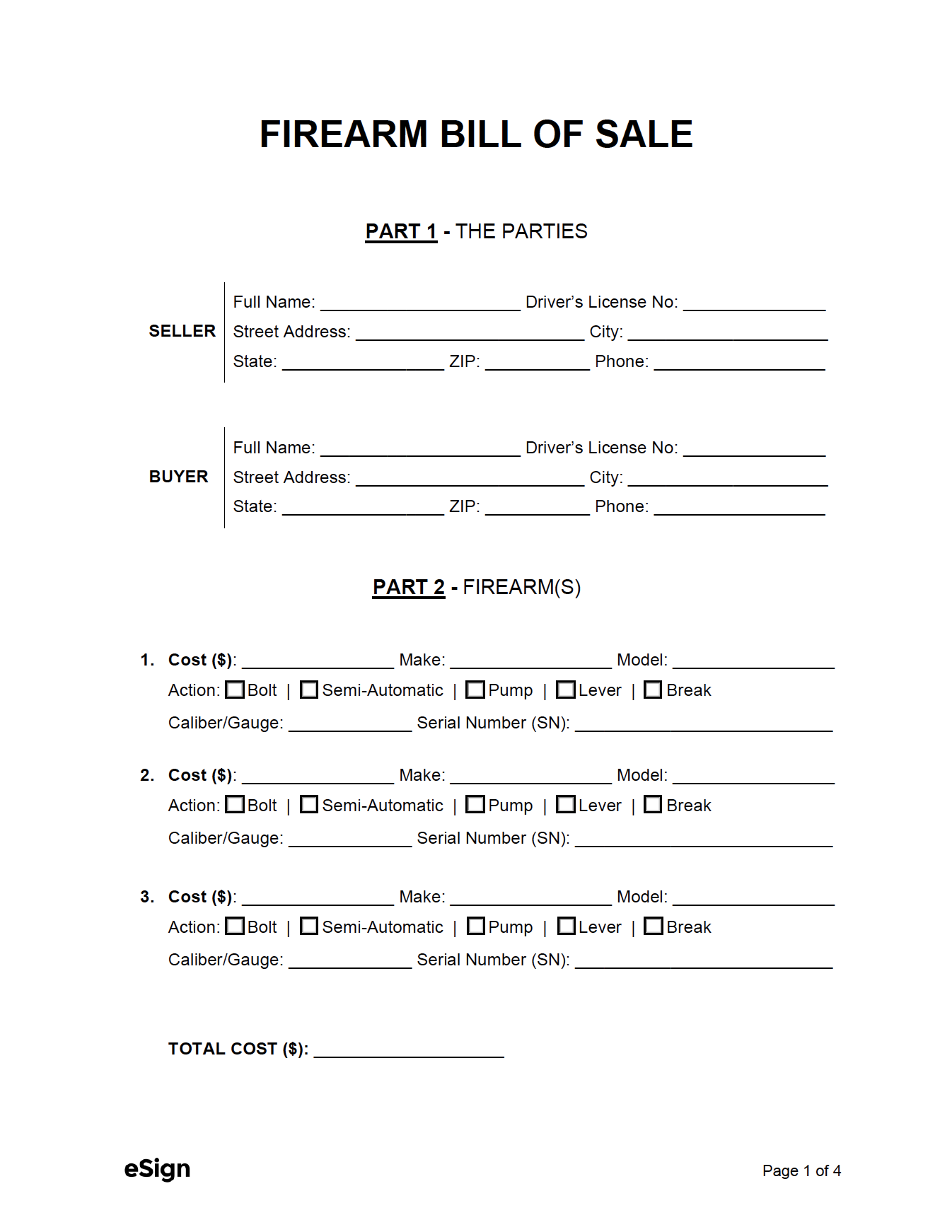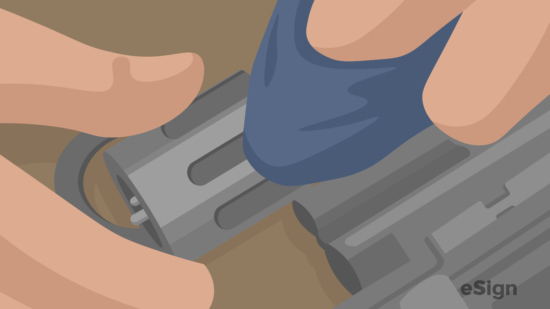By State
- Alabama
- Alaska
- Arizona
- Arkansas
- California
- Colorado
- Connecticut
- Delaware
- Florida
- Georgia
- Hawaii
- Idaho
- Illinois
- Indiana
- Iowa
- Kansas
- Kentucky
- Louisiana
- Maine
- Maryland
- Massachusetts
- Michigan
- Minnesota
- Mississippi
- Missouri
- Montana
- Nebraska
- Nevada
- New Hampshire
- New Jersey
- New Mexico
- New York
- North Carolina
- North Dakota
- Ohio
- Oklahoma
- Oregon
- Pennsylvania
- Rhode Island
- South Carolina
- South Dakota
- Tennessee
- Texas
- Utah
- Vermont
- Virginia
- Washington
- West Virginia
- Wisconsin
- Wyoming
Sample
Download: PDF, Word (.docx), OpenDocument
FIREARM BILL OF SALE
Date: [MM/DD/YYYY]
PART 1 – THE PARTIES
Seller Name: [SELLER NAME]
Address: [ADDRESS]
Buyer Name: [BUYER NAME]
Address: [ADDRESS]
PART 2 – FIREARM
Cost ($): [AMOUNT ($)] Make: [MAKE] Model: [MODEL]
Action: ☐ Bolt | ☐ Semi-Automatic | ☐ Pump | ☐ Lever | ☐ Break
Caliber/Gauge: [CALIBER/GAUGE] Serial Number (SN): [SERIAL #]
PART 3 – PURCHASE
The seller accepts monetary funds in the amount of [AMOUNT ($)] to be paid on the date of this bill of sale. Payment shall be made via [PAYMENT METHOD].
PART 4 – SIGNATURES
On this [MM/DD/YYYY], the buyer and seller agree to the above-described terms and conditions for the sale of the firearm.
Seller Signature: _______________________
Printed Name: [SELLER NAME]
Buyer Signature: _______________________
Printed Name: [BUYER NAME]
How to Sell a Firearm
Step 1 – Check State Laws
As firearm laws vary significantly from state to state, it’s highly recommended to verify any restrictions regarding private transactions within the relevant jurisdiction. Doing so may prevent complications from arising during the sale process.
Step 2 – Prepare the Firearm
Owners should consider cleaning the firearm before the sale (e.g., completely stripping the weapon, cleaning carbon fouling, re-lubricating parts, checking for damaged parts, etc.).
A well-maintained firearm typically sells for more than one in poor condition, and spending money on maintenance and parts is usually worthwhile.
Step 3 – Determine its Value
To assess a firearm’s price, it’s recommended to look at online listings for the same firearm. Some sites that have used gun listings include:
For valuable or collector-type firearms, GunValues can also be used.
Step 4 – Sell In-Person / List Online
There are generally three ways to sell a firearm:
Important: When handling a firearm, it should be unloaded, pointed in a safe direction, and treated as if it were loaded at ALL TIMES.
1. In-person (recommended)
In states that don’t require a background check on private sales, selling a firearm in person is the most convenient method. Once a trustworthy buyer is found, the payment exchanges hands, the bill of sale is signed, and the firearm is transferred to the buyer.
2. Pawnshop or Retail Store
Pawnshops can provide an appraisal of the firearm, though their offers are lower than standard market prices as they purchase items with the intent to re-sell. Retail stores (such as Cabelas) may offer a slightly higher amount.
3. Online
Selling online can help reach more potential buyers; however, additional requirements may apply. For example, firearms sold interstate must be shipped to an FFL (Federal Firearms License) holder. Additionally, shipping firearms must comply with federal and state regulations.
Firearm Sale/Transfer Laws by State
View State Requirements |
|||||
| STATE | REQUIREMENTS | LAWS | |||
| Alabama |
|
§§ 13A-11-63, 13A-11-57 | |||
| Alaska | None | N/A | |||
| Arizona | None | N/A | |||
| Arkansas | None | N/A | |||
| California |
|
§§ 28050(a), 26840, 26845, 28220(a)(1) | |||
| Colorado |
|
§ 18-12-112 | |||
| Connecticut |
|
§ 29-33 | |||
| Delaware |
|
§ 1448B | |||
| Florida | None | N/A | |||
| Georgia | None | N/A | |||
| Hawaii |
|
§ 134-2 | |||
| Idaho |
|
Ch. 33 | |||
| Illinois |
|
430 ILCS 65 | |||
| Indiana | None | ||||
| Iowa |
|
§ 724.15 | |||
| Kansas | None | ||||
| Kentucky | None | ||||
| Louisiana | None | ||||
| Maine | None | ||||
| Maryland |
|
§ 5-124 | |||
| Massachusetts |
|
§ 128A | |||
| Michigan |
|
§ 28.422a | |||
| Minnesota |
|
§ 624.7132 | |||
| Mississippi | None | ||||
| Missouri | None | ||||
| Montana | None | ||||
| Nebraska |
|
§ 69-2403 | |||
| Nevada |
|
NRS 202.2547 | |||
| New Hampshire | None | ||||
| New Jersey |
|
Ch. 54 | |||
| New Mexico |
|
§ 30-7-7.1 | |||
| New York |
|
§ 898 | |||
| North Carolina |
|
§ 14-402 | |||
| North Dakota | None | ||||
| Ohio | None | ||||
| Oklahoma | None | ||||
| Oregon |
|
§ 166.435 | |||
| Pennsylvania |
|
§ 6111 | |||
| Rhode Island |
|
§ 11-47-35.2 | |||
| South Carolina | None | ||||
| South Dakota | None | ||||
| Tennessee | None | ||||
| Texas | None | ||||
| Utah | None | ||||
| Vermont |
|
§ 4019 | |||
| Virginia |
|
§ 18.2-308.2 | |||
| Washington |
|
§ 9.41.113 | |||
| West Virginia | None | ||||
| Wisconsin | None | ||||
| Wyoming | None | ||||





